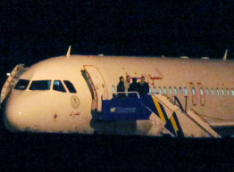
Turkish fighter jets forced a Syrian passenger plane to land in Ankara, the Turkish capital, on October 10. The plane was suspected of carrying weapons from Russia. The airliner was traveling from Moscow to Damascus with only thirty-five passengers and two crew members, even though the plane’s maximum capacity is one hundred eighty passengers. Turkish intelligence had reportedly received information that the Syrian plane could be carrying “non-civilian cargo.” The plane was forced to land and then held at Ankara’s Esenboga airport for several hours before authorities finally allowed it to take off again for Damascus. In conjunction with the forced take down, Turkey declared Syria’s airspace unsafe and ordered its civilian planes to avoid it.
Turkish authorities have declined to announce what they found on the Syrian airliner. However, reports have surfaced that parts of a missile were confiscated along with materials that should have been reported, but were not, before the flight. Other reports have surfaced that the Turkish government seized ten containers on board that held radio receivers, antennas, and other equipment “thought to be missile parts.” The forced take-down comes amid growing tensions between the two neighboring countries as reports from the border reveal there has been Syrian mortar and machine-gun fire heard on the Turkish side of the border. While it is unclear whether the firing from Syria was aimed at Turkey or errant Syrian rebel-government fire, the audible firing has heightened tensions on the border. Tensions have grown with Syria’s bordering neighbors since the Syrian civil war began nineteen months ago. Turkey, specifically, has been a safe haven for roughly 100,000 Syrian refugees, many of whom crossed the Orontes River, which separates Turkey from Syria.
In response to the forced take down, Syria has alleged its continued innocence, calling Turkey’s actions piracy and claiming that nothing illegal was onboard. The general manager of the Syrian Civil Aviation Agency called Turkey’s actions “contrary to regulations and aviation norms.” Russia has also been outspoken about its concern for the seventeen Russian passengers onboard. Reportedly, they were not allowed off the plane and denied medical treatment and food for eight hours, and Russia is demanding a reason for Turkey’s treatment of them. The Moscow airport also denied that there was any prohibited cargo on the Syrian plane. Vnukovo Airport spokeswoman Yelena Krylova stated that “[n]o objects whose transportation would have been forbidden under aviation regulations were on board.” All documentation concerning that cargo was also in order and completed as necessary.
Turkey’s action plays a role in the much larger foreign relations with the Middle East and Russia. Currently, Russia is one of Syria’s closest remaining allies and, along with China, has repeatedly blocked U.N. resolutions against the Syrian capital. The Syrian civil war continues to grow as battles have spilled over into the neighboring counties of Jordan, Lebanon, and Turkey. NATO has said that it would also get involved if Syria strikes because Turkey is a member of the organization. NATO Secretary-General Anders Fogh Rasmussen said that there are plans in place to defend Turkey militarily if such a situation arises.
As more countries begin to take actions against the Syrian government, it will be forced to acquiesce to global pressure and end its violence against the rebels. The death toll in the Syrian civil war has reached upwards of 20,000 even as global sanctions continue to pour on Syria and President Bashar al-Assad. Turkey is only the latest country to take action against Syria and, certainly, will not be the last. If Syria continues to ignore global pressure to end its violence, then military action from outside its borders may be the only resolution to end the internal violence within Syria.
Dan Warhola is a 3L at the University of Denver Sturm College of Law and the Executive Editor of the Denver Journal of International Law and Policy.


